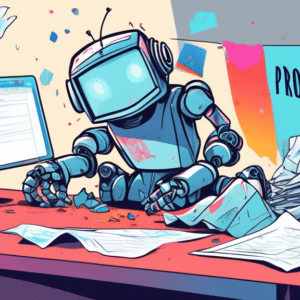Artificial intelligence (AI) is rapidly transforming the business landscape, offering unprecedented opportunities for automation, innovation, and efficiency. However, the path to AI adoption is not without its obstacles. A recent study reveals a sobering statistic: nearly half of all business AI projects fail to reach completion.
The High Failure Rate of AI Projects: Unpacking the Challenges
The allure of AI is undeniable. Businesses are eager to leverage its power to streamline operations, gain a competitive edge, and drive revenue growth. However, the complexities of AI implementation often lead to unforeseen challenges, contributing to a high failure rate.
Several factors contribute to this trend:
1. Lack of Clear Business Objectives and Strategy:
One of the primary reasons for AI project failures is the absence of well-defined business objectives. Without a clear understanding of what they aim to achieve with AI, businesses risk investing in solutions that don’t align with their overall strategy. This lack of direction can lead to scope creep, resource misallocation, and ultimately, project failure.
2. Data Quality and Availability:
AI models heavily rely on vast amounts of high-quality data for training and accurate predictions. However, many businesses struggle with data silos, inconsistent data formats, and poor data quality. These data challenges can severely hinder the development and effectiveness of AI solutions, leading to inaccurate results and failed projects.
3. Shortage of AI Talent and Expertise:
Developing and deploying successful AI solutions requires specialized skills and expertise in areas like machine learning, data science, and AI engineering. Unfortunately, there is a significant shortage of qualified AI professionals in the job market. This talent gap makes it challenging for businesses to build and manage AI teams, contributing to project delays and failures.
4. Integration Challenges with Existing Systems:
Integrating AI solutions into existing IT infrastructure can be a complex and time-consuming process. Legacy systems often lack the flexibility and compatibility to seamlessly integrate with AI tools and platforms. This integration challenge can lead to costly delays, technical difficulties, and ultimately, project abandonment.
5. Unrealistic Expectations and Lack of Patience:
AI is not a magic bullet that delivers instant results. Developing and deploying effective AI solutions takes time, experimentation, and continuous improvement. Businesses that approach AI with unrealistic expectations of immediate ROI or lack the patience to navigate the iterative nature of AI development are more likely to experience project failures.
Overcoming the Obstacles: Strategies for Successful AI Implementation
While the high failure rate of AI projects is a cause for concern, it is not an insurmountable obstacle. By understanding the common pitfalls and adopting a strategic approach, businesses can significantly increase their chances of successful AI implementation.
1. Define Clear Business Objectives:
Before embarking on any AI project, it’s crucial to clearly define the business problem you aim to solve or the opportunity you want to leverage. Establish measurable key performance indicators (KPIs) to track progress and measure the success of your AI initiatives.
2. Ensure Data Quality and Accessibility:
High-quality data is the foundation of successful AI. Establish robust data governance policies, invest in data cleansing and preparation tools, and break down data silos to ensure your AI models have access to accurate and reliable information.
3. Build or Augment Your AI Team:
Address the AI talent gap by investing in training and development programs for your existing workforce or partnering with external AI consulting firms. Building a skilled AI team is essential for navigating the complexities of AI development and deployment.
4. Plan for Integration Challenges:
Thoroughly assess your existing IT infrastructure and identify potential integration challenges early on. Consider modernizing legacy systems or adopting cloud-based AI platforms that offer greater flexibility and scalability.
5. Set Realistic Expectations and Embrace Iteration:
Understand that AI is an iterative process that requires experimentation and continuous improvement. Set realistic expectations for AI project timelines and ROI, and be prepared to adjust your approach based on learnings and feedback.
Conclusion: Navigating the Path to AI Success
While the high failure rate of business AI projects highlights the challenges of AI adoption, it underscores the importance of a strategic and well-informed approach. By addressing the common pitfalls, fostering a data-driven culture, and embracing an iterative mindset, businesses can harness the transformative power of AI and unlock its full potential.
Beyond the Numbers: Embracing a Culture of AI
The success of AI implementation extends beyond technical proficiency. It requires a cultural shift within organizations. Businesses need to foster a data-driven mindset, encourage experimentation, and embrace agility to adapt to the evolving nature of AI.
Investing in change management initiatives, promoting AI literacy across all levels of the organization, and celebrating both successes and failures as learning opportunities are crucial steps in building a sustainable AI culture.
The Future of AI: A Continuous Journey of Innovation
The field of AI is constantly evolving, with new advancements and applications emerging at a rapid pace. Businesses that embrace a mindset of continuous learning, adaptation, and collaboration will be best positioned to navigate the evolving AI landscape and leverage its full potential.
The journey towards successful AI implementation may be fraught with challenges, but the rewards are undeniable. By learning from past failures, embracing best practices, and fostering a culture of innovation, businesses can unlock the transformative power of AI and shape a future driven by intelligent automation and data-driven insights.
